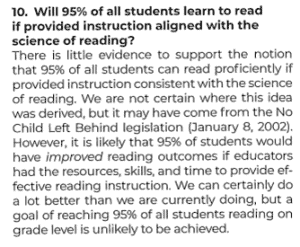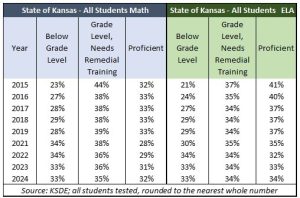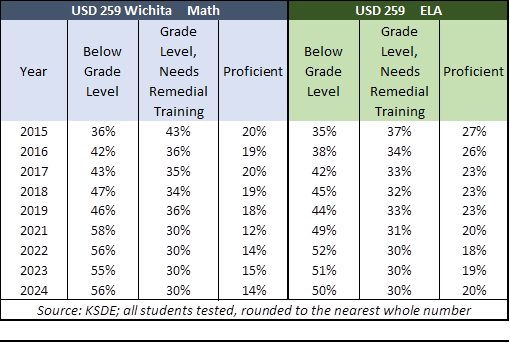Emerson Elementary School in USD 500 Kansas City received a federal school improvement grant in 2010, and district officials met with the staff to decide how best to use the money. They were shocked to learn that about half of the staff said the Emerson kids weren’t capable of learning, so the district appropriately replaced those staff members with people who believed all children are capable of learning.[i]
Those former Emerson employees were guilty of what President George W. Bush called “the soft bigotry of low expectations.” At a January 21 hearing before the House Education Committee, Kansas Education Commissioner Randy Watson used the low expectations excuse to avoid accountability for ensuring that all students can at least read at grade level.

Watson said, “It’s a myth” that 95% of students can read at grade level with proper training, referencing a report from The Reading League.
The report he referenced says, “There is little evidence to support the notion that 95% of all students can read proficiently if provided instruction consistent with the science of reading.” Notice the emphasis on reading “proficiently,” whereas Watson spoke of reading “at grade level.”
One might think “proficient” and “grade level” mean the same thing, but not at the Kansas Department of Education.
Levels 2 through 4 on the state assessment are considered at or above academic expectations for grade level, but only Level 3 and above are proficient and academically prepared for post-secondary success. Students scoring in Level 2 have only a basic ability to understand and use material needed for post-secondary success, whereas students scoring in Level 3 have an effective ability to do so.
The Reading Source report uses “grade level” and “proficient” interchangeably, but Watson was trying to reduce expectations for getting students to Level 2, which is not “proficient” in Kansas. The 2024 state assessment results show that one in three students are below grade level in English language arts; 34% are in Level 2, and only a third of students are proficient.

As tragic as it is to hear “they can’t read” from individual teachers possibly worn down by years of systemic failure above them, it is absolutely horrendous that the individual “in charge” of the K12 public education system tries to set the same low bar. We’re not expecting the failure of NCLB’s 100% proficiency goals. Watson is angling to let the system he runs off the hook in direct contravention of the leading research.
Dr. Louisa Moats, a board member and officer of the International Dyslexia Association, says, “The tragedy here is that most reading failure is unnecessary. We now know that classroom teaching itself, when it includes a range of research-based components and practices, can prevent and mitigate reading difficulty. Although home factors do influence how well and how soon students read, informed classroom instruction that targets specific language, cognitive, and reading skills beginning in kindergarten enhances success for all but a very small percentage of students with learning disabilities or severe dyslexia. Researchers now estimate that 95 percent of all children can be taught to read by the end of first grade, with future achievement constrained* only by students’ reasoning and listening comprehension abilities.”
Nathaniel Hansford, a teacher who writes about education at Pedagogy Non Grata, looked into the 95% claims and found that most seem to be opinions that don’t cite experimental research. He did find two references of experimental evidence to support the claim with extra, but not just core instruction.
Watson’s Department of Education has a pattern of low expectations
Randy Watson has been the State Education Commissioner since 2015 and has consistently pushed the State Board of Education to reduce expectations.
He convinced the State Board to approve his Kansans Can program and a new accreditation system, which replaced academic improvement with requirements for social-emotional learning (SEL). The State Constitution calls for academic improvement, and state law requires the State Board of Education to require improvement in its accreditation system, but Watson’s Department of Education ignores those legal requirements.
The results have been disastrously predictable. College readiness on the ACT in English, Reading, Math, and Science plummeted from 32% in 2015 to just 18% last year.

The Department of Education fought against last year’s Kansas Blueprint for Literacy, which targets reducing the number of students reading in Level 1 to 10% and improving proficiency to 50% by 2033. Last year’s State Board of Education wanted nothing to do with any measure of accountability but eventually went along when it became clear that the Blueprint for Literacy was going to pass. Since then, there have been consistent rumblings—undocumented at this point—about KSDE undermining the Blueprint itself at many points.
In December, Watson proposed eliminating the state assessment test for 10th-grade students on the pretense that high school students don’t take the test seriously, which leads to lower scores. The real reason is more likely an attempt to make those bad scores disappear (e.g., 46% below grade level in math and only 21% proficient.)
When the 2023 state assessment results showed tiny improvements but were still below pre-pandemic levels, Watson told State School Board members they should “dance around the capitol” to celebrate.
Like his allies at the Kansas Association of School Boards (KASB), Watson avoids using actual numbers, like 34% proficient, and instead makes vague references to “improvement.” Further, he insists that there is no data on the percentage of students below grade level because the state assessment “only measures grade-level performance.” Watson acknowledges that Level 2 designates grade level but won’t put a label on Level 1 – which everyone outside the education bureaucracy knows is below grade level.
Randy Watson is exhibit #1 showing that student outcomes won’t change until adult behaviors change. He apparently has no interest in changing, so the new State School Board will have to decide whether to make him change or accept that many Kansas students will not get the education they need to be successful in life.
____________________
[i] “Gannon: The Fallacy of the Court’s Emerson Analysis,” Mike O’Neal, Kansas Policy Institute, April 2017. https://kansaspolicy.org/gannon-fallacy-courts-emerson-analysis






